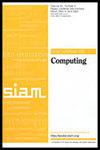竞争性追逐凸体
IF 1.6
3区 计算机科学
Q3 COMPUTER SCIENCE, THEORY & METHODS
引用次数: 1
摘要
假设是某个度量空间中的一个集合族。在追逐问题中,在线算法观察一个集合的请求序列,并通过给出这些集合中的一个点序列来在线响应。移动代价是这些连续点之间的距离。竞争比是在线算法的总移动量与预先知道请求序列所能达到的最小移动量之间的最坏情况比(超过请求序列)。如果存在竞争比有限的在线算法,则称为可追族。1991年,Linial和Friedman推测欧几里得空间中的凸集族是可追的。我们证明了这个猜想。本文章由计算机程序翻译,如有差异,请以英文原文为准。
Competitively Chasing Convex Bodies
Let be a family of sets in some metric space. In the -chasing problem, an online algorithm observes a request sequence of sets in and responds (online) by giving a sequence of points in these sets. The movement cost is the distance between consecutive such points. The competitive ratio is the worst case ratio (over request sequences) between the total movement of the online algorithm and the smallest movement one could have achieved by knowing in advance the request sequence. The family is said to be chaseable if there exists an online algorithm with finite competitive ratio. In 1991, Linial and Friedman conjectured that the family of convex sets in Euclidean space is chaseable. We prove this conjecture.
求助全文
通过发布文献求助,成功后即可免费获取论文全文。
去求助
来源期刊

SIAM Journal on Computing
工程技术-计算机:理论方法
CiteScore
4.60
自引率
0.00%
发文量
68
审稿时长
6-12 weeks
期刊介绍:
The SIAM Journal on Computing aims to provide coverage of the most significant work going on in the mathematical and formal aspects of computer science and nonnumerical computing. Submissions must be clearly written and make a significant technical contribution. Topics include but are not limited to analysis and design of algorithms, algorithmic game theory, data structures, computational complexity, computational algebra, computational aspects of combinatorics and graph theory, computational biology, computational geometry, computational robotics, the mathematical aspects of programming languages, artificial intelligence, computational learning, databases, information retrieval, cryptography, networks, distributed computing, parallel algorithms, and computer architecture.
 求助内容:
求助内容: 应助结果提醒方式:
应助结果提醒方式:


